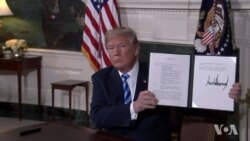The United States is pulling out of a 1955 treaty with Iran in response to the International Court of Justice ordering the United States to lift sanctions on Tehran involving medicine, food and airplane parts.
The Treaty of Amity established economic relations and consular rights between the two countries.
WATCH: US Terminates 1955 Treaty With Iran After ICJ Ruling
The withdrawal marks the latest indication of escalating tensions between Washington and Tehran.
"Our dispute is with the ayatollahs who have taken Iran from a respected position in the international community to being a rogue state, our dispute has never been with the people of Iran," National Security Adviser John Bolton told reporters at the White House.
"Our policy is not regime change, but we do expect substantial change in their behavior," added Bolton, explaining that the administration of President Donald Trump, after reimposing sanctions on Tehran, will "do whatever else is necessary to ensure we bring maximum pressure to stop its malign behavior across the board."
Iran had complained to the U.N. court that the move by Washington to reimpose sanctions, which had been lifted under the 2015 international nuclear agreement, violated the 1955 treaty.
The court said in a Wednesday ruling U.S. sanctions could endanger civil aviation safety in Iran and the measures affecting food, medicine and medical devices could have detrimental impacts on the health and lives of Iranians.
The ruling directed the United States to "remove, by any means of its choosing, any impediments" affecting the free import of products in those sectors. It further called on both countries to "refrain from any action which might aggravate or extend the dispute before the court or make it more difficult to resolve."
The court's rulings are binding, but it has no means to enforce them.
Iran's foreign minister welcomed the court's decision, tweeting that the ICJ decision is a "victory for the rule of law" over an "outlaw regime."
Bolton sees it differently, telling reporters the court ruling is "a defeat for Iran" as "it correctly rejected nearly all of Iran's requests, but we are disappointed that the ICJ failed to recognize that is has no jurisdiction to issue any order with respect to sanctions the United States imposes to protect its own essential security under the treaty."
At the State Department prior to Bolton's remarks, Secretary of State Mike Pompeo told reporters "Iran is abusing the ICJ for political and propaganda purposes."
Pompeo added that "given Iran's history of terrorism, ballistic missile activity, and other malign behaviors, Iran's claims under the treaty are absurd."
The U.S. reimposition of sanctions on Iran came after Trump in May declared Tehran non-compliant with the 2015 multinational deal that had brought sanctions relief in exchange for limiting its nuclear program.
The U.N. atomic energy agency, which is in charge of monitoring the agreement, has reported Iran is in compliance of the Joint Comprehensive Plan of Agreement, signed between Iran and the P5+1 (the five permanent members of the United Nations Security Council plus Germany).
Iran is not dismantling its nuclear programs and reports indicate it is actually increasing them, according to Bolton.
Responding to a claim by Israeli Prime Minister Benjamin Netanyahu that Iran has a "secret atomic warehouse" and the International Atomic Energy Agency should inspect the site, the head of the U.N.'s nuclear watchdog, Yukio Amano, replied "the agency sends inspectors to sites and locations only when needed. The agency uses all safeguards relevant to information available to it but it does not take any information at face value."
Asked by VOA about the Israeli claim and the IAEA response, Bolton termed "extremely impressive" the evidence obtained by Israel.
"We've been very supportive of the Israeli effort and supportive of the IAEA taking new steps to follow up on it," said Bolton.
The IAEA repeatedly has indicated that Iran remains in compliance with the nuclear deal.
The national security adviser also announced the Trump administration is reviewing all other international agreements that could expose it to binding decisions by the ICJ.
"We will commence a review of all international agreements that may still expose the United States to purported binding jurisdiction, dispute resolution in the International Court of Justice," Bolton said. "The United States will not sit idly by as baseless politicized claims are brought against us."
One immediate withdrawal ordered by Trump, according to Bolton, is the optional protocol on dispute resolution to the Vienna Convention.
"This is in connection with a case brought by the so-called State of Palestine naming the United States as a defendant, challenging our move of our embassy from Tel Aviv to Jerusalem," explained Bolton. "I'd like to stress the United States remains a party to the underlying Vienna Convention on Diplomatic Relations and we expect all other parties to abide by their international obligations under the convention."










